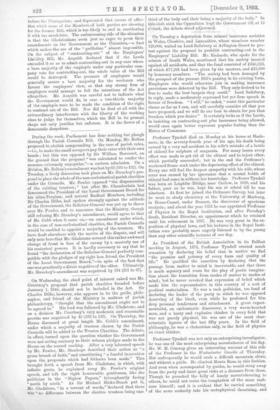During the week, Parliament has done nothing but plough through
the Parish Councils Bill. On Monday, Mr. Bolton proposed to abolish compounding in the case of parish rates, —i.e., to make the small occupiers pay their rates with their own hands ; but this was opposed by Sir William Harcourt, on the ground that the proposal "was calculated to render the measure extremely unpopular,"—a curious admission. On a division, Mr. Bolton's amendment was lost by 63 (195 to 132). On Tuesday, a lively discussion took place on Mr. Strachey's pro- posal to place the whole of the non-ecclesiastical parish charities under the Councils. Mr. Fowler opposed "the dispossession of the existing trustees ; " but after Mr. Chamberlain had denounced the President of the Local Government Board for his ultra-Toryism, and several Radical Members, including Sir Charles Dilke, had spoken strongly against the attitude of the Government, the Solicitor-General was put up to throw over Mr. Fowler, and to announce that the Ministry, though still refusing Mr. Strachey's amendment, would agree to that of Mr. Cobb when it came on,—an amendment under which, in the case of non-ecclesiastical charities, the Parish Councils would be enabled to appoint a majority of the trustees. We have dealt elsewhere with the merits of the dispute, and will only note here that Mr. Gladstone covered this rather awkward change of front in face of the enemy by a masterly use of his oratorical powers. It is hardly necessary to say that he found "the declaration of the Solicitor-General perfectly com- patible with the pledgee of my right hon. friend, the President of the Local Government Board,"—in spite of the fact that one was practically a direct negative of the other. Ultimately, Mr. Strachey's amendment was negatived by 184 (251 to 67).






































 Previous page
Previous page